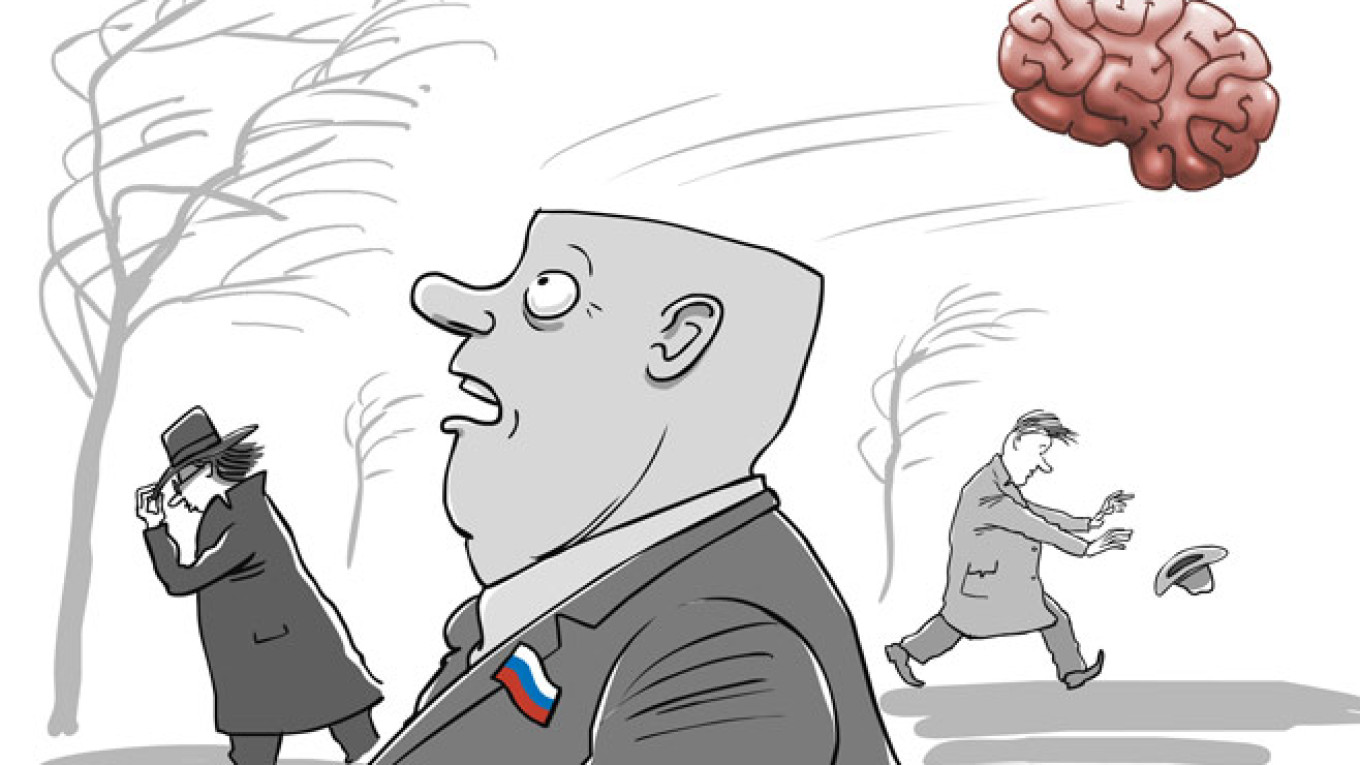According to the laws of evolution, an unused organ gradually atrophies and finally devolves into a vestigial organ. This law is used to explain why a monkey's tail eventually became nothing more than a tailbone in humans. And in exactly the same way, the Russian parliament's upper house, the Federation Council, has atrophied into a mostly pointless political tailbone in the country's government, becoming a body without a brain.
This was demonstrated when the Federation Council, upon President Vladimir Putin's request, dutifully revoked his authority to send Russian troops into Ukraine. Putin's request was illogical and absurd. When the Federation Council first granted Putin the authority to intervene in Ukraine on March 1, it did not obligate him to use force, but only permitted it. By asking lawmakers to essentially tie his hands, it would seem that Putin does not trust himself to behave rationally. Perhaps he believes that, in a fit of madness, he might order a full-on invasion of eastern Ukraine.
However, during a visit to Austria, Putin awkwardly explained that he had needed the authority granted him on March 1 for the sole purpose of annexing Crimea. Now that Crimea has been incorporated into Russia, the right to use military force is no longer necessary. As Putin openly explained, the Russian military enabled Crimean residents to fully express their will, an impeccably democratic and legal action. Or translated from politico-speak, Russia used its military to grab a sizable chunk of a neighboring state's territory.
Now, in his letter to Federation Council Speaker Valentina Matvienko, Putin argues that the earlier decision to permit the use of troops should be revoked "in order to normalize and resolve the situation in Ukraine's eastern regions." He thus effectively confirms that the earlier threat of the use of Russian troops placed an obstacle in Kiev's path in its attempts to come to terms with the Donbass separatists.
Behind all of these extremely awkward verbal gymnastics, Putin is trying to hide the obvious fact that the Kremlin is frightened by the prospect of further Western sanctions. According to news reports, the U.S. and European Union have already agreed to implement damaging sectoral sanctions should they believe Russia to be working to further destabilize Ukraine.
The only way Putin can delay them is to show that he has no intention of invading Ukraine's eastern and southern regions. The problem is that nobody believes his promises anymore. Recall that just days before Russia annexed Crimea, Putin announced that no such move was under consideration. And now he is attempting to provide convincing evidence that Moscow has no intention of seizing eastern and southern Ukraine. And to that end, he had to order the entire Federation Council to do a humiliating about-face and force it to revoke his earlier authority.
But that is not the funniest thing. Vedomosti pointed out that all of these actions are meaningless because the Federation Council granted then-President Dmitry Medvedev the "perpetual right for the operational use of the armed forces beyond Russia's borders" back in 2009, and nobody has since withdrawn that right from the president.
Most observers responded to Putin's recent initiative by saying that if he just gives the word, the "senators" will quickly restore his right to use Russian troops in Ukraine. But now it turns out that, from a legal standpoint, Putin had that right all along.
This entire episode illustrates the extent to which Russia's institutions have degenerated. It turns out that the Federation Council members forgot what powers they granted the president five years ago. And yet at stake here is the question of war and peace — the most important prerogative of parliaments everywhere. The world over, those questions are considered too important to entrust to one single person — whether a president or a prime minister. But the Russian parliament long ago forfeited its right and voluntarily acts as a rubber stamp for every initiative from the presidential administration.
In an expression of unalloyed servility, "Senator" Artur Chilingarov, without the least hesitation, told journalists, "If the president proposed it, that means the Federation Council supports it."
And when adults voluntarily behave as puppets, it results in a blatant disregard for their avowed responsibilities, tearing away even the veneer of respectability. Why bother with legal formalities if these so-called "senators" serve no function and have made themselves entirely dependent on the whims and prejudices of a single man — Vladimir Putin?
In effect, Russia has turned back the clock more than 65 years. After all, even former Soviet leaders Nikita Khrushchev and Leonid Brezhnev could not make decisions without backing from other Politburo members. Only Josef Stalin had the unchallenged authority to act independently.
Alexander Golts is deputy editor of the online newspaper Yezhednevny Zhurnal.
A Message from The Moscow Times:
Dear readers,
We are facing unprecedented challenges. Russia's Prosecutor General's Office has designated The Moscow Times as an "undesirable" organization, criminalizing our work and putting our staff at risk of prosecution. This follows our earlier unjust labeling as a "foreign agent."
These actions are direct attempts to silence independent journalism in Russia. The authorities claim our work "discredits the decisions of the Russian leadership." We see things differently: we strive to provide accurate, unbiased reporting on Russia.
We, the journalists of The Moscow Times, refuse to be silenced. But to continue our work, we need your help.
Your support, no matter how small, makes a world of difference. If you can, please support us monthly starting from just $2. It's quick to set up, and every contribution makes a significant impact.
By supporting The Moscow Times, you're defending open, independent journalism in the face of repression. Thank you for standing with us.
Remind me later.



